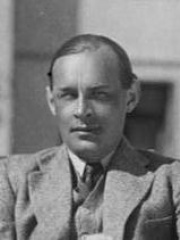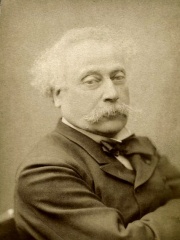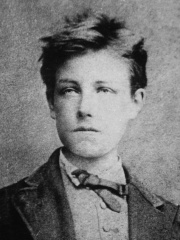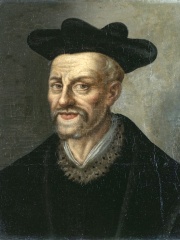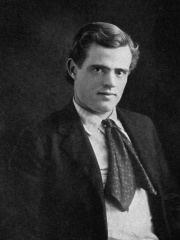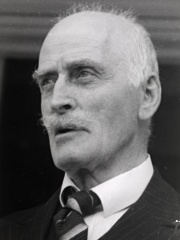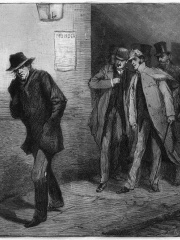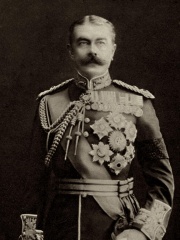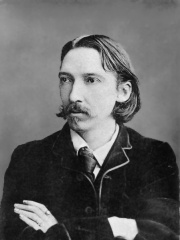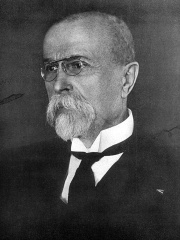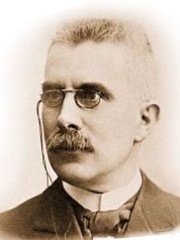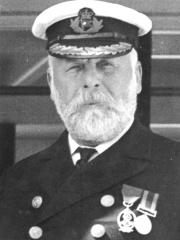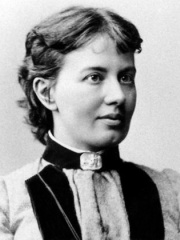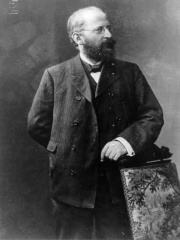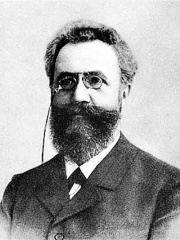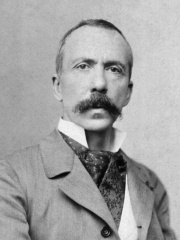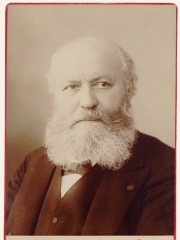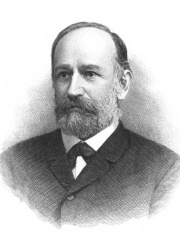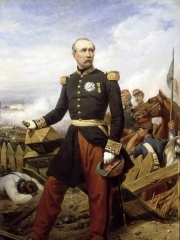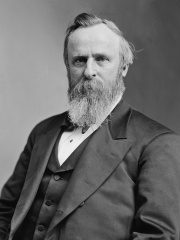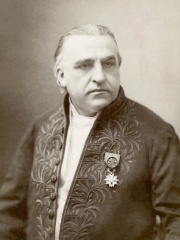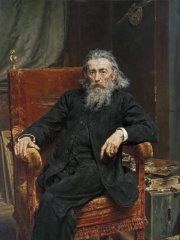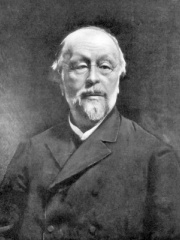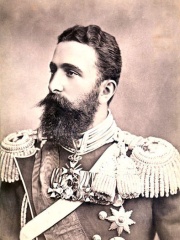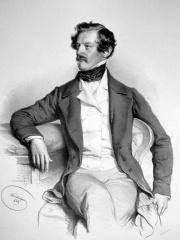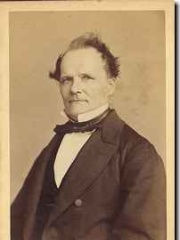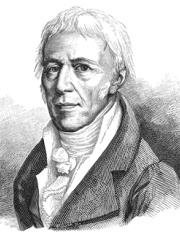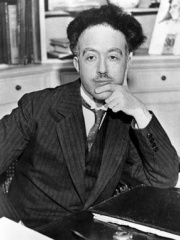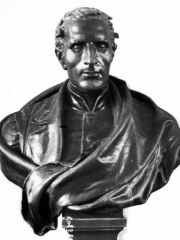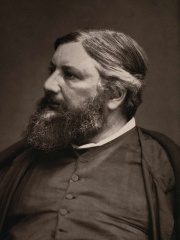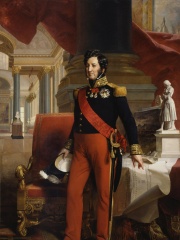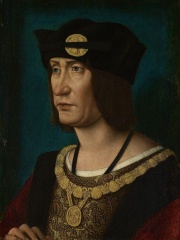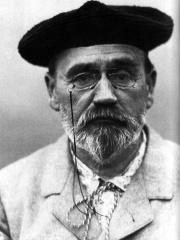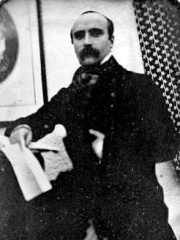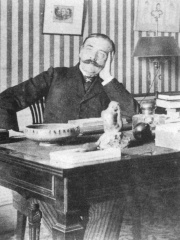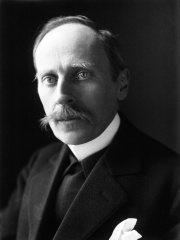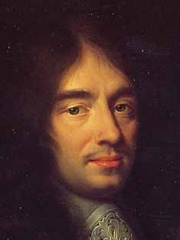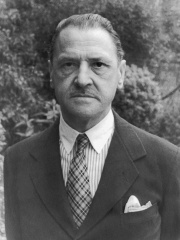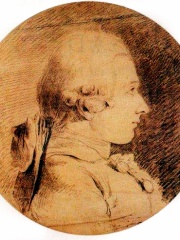WRITER
Guy de Maupassant
1850 - 1893
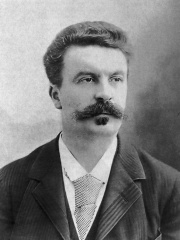
 Guy de Maupassant
Guy de Maupassant
Henri René Albert Guy de Maupassant (UK: , US: ; French: [ɡi d(ə) mopasɑ̃]; 5 August 1850 – 6 July 1893) was a 19th-century French author, celebrated as a master of the short story, as well as a representative of the naturalist school, depicting human lives, destinies and social forces in disillusioned and often pessimistic terms. Maupassant was a protégé of Gustave Flaubert and his stories are characterized by economy of style and efficient, seemingly effortless dénouements. Many are set during the Franco-Prussian War of the 1870s, describing the futility of war and the innocent civilians who, caught up in events beyond their control, are permanently changed by their experiences. He wrote 300 short stories, six novels, three travel books, and one volume of verse. Read more on Wikipedia
His biography is available in 102 different languages on Wikipedia. Guy de Maupassant is the 101st most popular writer (up from 119th in 2024), the 96th most popular biography from France (up from 123rd in 2019) and the 19th most popular French Writer.
Guy de Maupassant is most famous for his short stories.
Memorability Metrics
Page views of Guy de Maupassant by language
Among WRITERS
Among writers, Guy de Maupassant ranks 101 out of 7,302. Before him are Louisa May Alcott, Erich Maria Remarque, Ursula K. Le Guin, Isaac Asimov, Paulo Coelho, and Virginia Woolf. After him are Alexandre Dumas fils, Miyamoto Musashi, Arthur Rimbaud, François Rabelais, Jack London, and Knut Hamsun.
Most Popular Writers in Wikipedia
Go to all RankingsLouisa May Alcott
1832 - 1888
HPI: 81.95
Rank: 95
Erich Maria Remarque
1898 - 1970
HPI: 81.94
Rank: 96
Ursula K. Le Guin
1929 - 2018
HPI: 81.89
Rank: 97
Isaac Asimov
1920 - 1992
HPI: 81.85
Rank: 98
Paulo Coelho
1947 - Present
HPI: 81.81
Rank: 99
Virginia Woolf
1882 - 1941
HPI: 81.81
Rank: 100
Guy de Maupassant
1850 - 1893
HPI: 81.81
Rank: 101
Alexandre Dumas fils
1824 - 1895
HPI: 81.76
Rank: 102
Miyamoto Musashi
1584 - 1645
HPI: 81.76
Rank: 103
Arthur Rimbaud
1854 - 1891
HPI: 81.74
Rank: 104
François Rabelais
1494 - 1553
HPI: 81.73
Rank: 105
Jack London
1876 - 1916
HPI: 81.73
Rank: 106
Knut Hamsun
1859 - 1952
HPI: 81.71
Rank: 107
Contemporaries
Among people born in 1850, Guy de Maupassant ranks 2. Before him is Jack the Ripper. After him are Herbert Kitchener, 1st Earl Kitchener, Robert Louis Stevenson, Karl Ferdinand Braun, Tomáš Garrigue Masaryk, Henry Louis Le Chatelier, Edward Smith, Sofia Kovalevskaya, Eduard Bernstein, Hermann Ebbinghaus, and Charles Richet. Among people deceased in 1893, Guy de Maupassant ranks 2. Before him is Pyotr Ilyich Tchaikovsky. After him are Charles Gounod, Josef Stefan, Patrice de MacMahon, Rutherford B. Hayes, Jean-Martin Charcot, Jan Matejko, Hippolyte Taine, Alexander of Battenberg, Baron Alexander von Bach, and Ernst Kummer.
Others Born in 1850
Go to all RankingsJack the Ripper
EXTREMIST
1850 - Present
HPI: 87.14
Rank: 1
Guy de Maupassant
WRITER
1850 - 1893
HPI: 81.81
Rank: 2
Herbert Kitchener, 1st Earl Kitchener
ENGINEER
1850 - 1916
HPI: 79.10
Rank: 3
Robert Louis Stevenson
WRITER
1850 - 1894
HPI: 79.06
Rank: 4
Karl Ferdinand Braun
INVENTOR
1850 - 1918
HPI: 77.57
Rank: 5
Tomáš Garrigue Masaryk
POLITICIAN
1850 - 1937
HPI: 77.19
Rank: 6
Henry Louis Le Chatelier
CHEMIST
1850 - 1936
HPI: 76.20
Rank: 7
Edward Smith
MILITARY PERSONNEL
1850 - 1912
HPI: 75.53
Rank: 8
Sofia Kovalevskaya
MATHEMATICIAN
1850 - 1891
HPI: 75.24
Rank: 9
Eduard Bernstein
POLITICIAN
1850 - 1932
HPI: 75.16
Rank: 10
Hermann Ebbinghaus
PSYCHOLOGIST
1850 - 1909
HPI: 74.08
Rank: 11
Charles Richet
BIOLOGIST
1850 - 1935
HPI: 73.45
Rank: 12
Others Deceased in 1893
Go to all RankingsPyotr Ilyich Tchaikovsky
COMPOSER
1840 - 1893
HPI: 89.39
Rank: 1
Guy de Maupassant
WRITER
1850 - 1893
HPI: 81.81
Rank: 2
Charles Gounod
COMPOSER
1818 - 1893
HPI: 78.69
Rank: 3
Josef Stefan
MATHEMATICIAN
1835 - 1893
HPI: 75.70
Rank: 4
Patrice de MacMahon
POLITICIAN
1808 - 1893
HPI: 74.91
Rank: 5
Rutherford B. Hayes
POLITICIAN
1822 - 1893
HPI: 73.87
Rank: 6
Jean-Martin Charcot
PHYSICIAN
1825 - 1893
HPI: 73.69
Rank: 7
Jan Matejko
PAINTER
1838 - 1893
HPI: 73.20
Rank: 8
Hippolyte Taine
HISTORIAN
1828 - 1893
HPI: 73.03
Rank: 9
Alexander of Battenberg
POLITICIAN
1857 - 1893
HPI: 72.49
Rank: 10
Baron Alexander von Bach
POLITICIAN
1813 - 1893
HPI: 69.71
Rank: 11
Ernst Kummer
MATHEMATICIAN
1810 - 1893
HPI: 68.68
Rank: 12
In France
Among people born in France, Guy de Maupassant ranks 96 out of 6,770. Before him are Jean-Baptiste Lamarck (1744), Louis de Broglie (1892), Louis Braille (1809), Jean-Paul Belmondo (1933), Louis de Funès (1914), and Gustave Courbet (1819). After him are William the Conqueror (1028), Alexandre Dumas fils (1824), Louis Philippe I (1773), Arthur Rimbaud (1854), François Rabelais (1494), and Louis XII of France (1462).
Others born in France
Go to all RankingsJean-Baptiste Lamarck
BIOLOGIST
1744 - 1829
HPI: 82.06
Rank: 90
Louis de Broglie
PHYSICIST
1892 - 1987
HPI: 82.00
Rank: 91
Louis Braille
INVENTOR
1809 - 1852
HPI: 81.98
Rank: 92
Jean-Paul Belmondo
ACTOR
1933 - 2021
HPI: 81.93
Rank: 93
Louis de Funès
ACTOR
1914 - 1983
HPI: 81.86
Rank: 94
Gustave Courbet
PAINTER
1819 - 1877
HPI: 81.84
Rank: 95
Guy de Maupassant
WRITER
1850 - 1893
HPI: 81.81
Rank: 96
William the Conqueror
NOBLEMAN
1028 - 1087
HPI: 81.79
Rank: 97
Alexandre Dumas fils
WRITER
1824 - 1895
HPI: 81.76
Rank: 98
Louis Philippe I
POLITICIAN
1773 - 1850
HPI: 81.75
Rank: 99
Arthur Rimbaud
WRITER
1854 - 1891
HPI: 81.74
Rank: 100
François Rabelais
WRITER
1494 - 1553
HPI: 81.73
Rank: 101
Louis XII of France
POLITICIAN
1462 - 1515
HPI: 81.70
Rank: 102
Among WRITERS In France
Among writers born in France, Guy de Maupassant ranks 19. Before him are Émile Zola (1840), Gustave Flaubert (1821), Octave Mirbeau (1848), Stendhal (1783), Romain Rolland (1866), and Charles Perrault (1628). After him are Alexandre Dumas fils (1824), Arthur Rimbaud (1854), François Rabelais (1494), W. Somerset Maugham (1874), Marquis de Sade (1740), and Anatole France (1844).
Émile Zola
1840 - 1902
HPI: 84.25
Rank: 13
Gustave Flaubert
1821 - 1880
HPI: 84.13
Rank: 14
Octave Mirbeau
1848 - 1917
HPI: 84.08
Rank: 15
Stendhal
1783 - 1842
HPI: 83.83
Rank: 16
Romain Rolland
1866 - 1944
HPI: 83.15
Rank: 17
Charles Perrault
1628 - 1703
HPI: 83.14
Rank: 18
Guy de Maupassant
1850 - 1893
HPI: 81.81
Rank: 19
Alexandre Dumas fils
1824 - 1895
HPI: 81.76
Rank: 20
Arthur Rimbaud
1854 - 1891
HPI: 81.74
Rank: 21
François Rabelais
1494 - 1553
HPI: 81.73
Rank: 22
W. Somerset Maugham
1874 - 1965
HPI: 81.60
Rank: 23
Marquis de Sade
1740 - 1814
HPI: 81.34
Rank: 24
Anatole France
1844 - 1924
HPI: 81.25
Rank: 25

